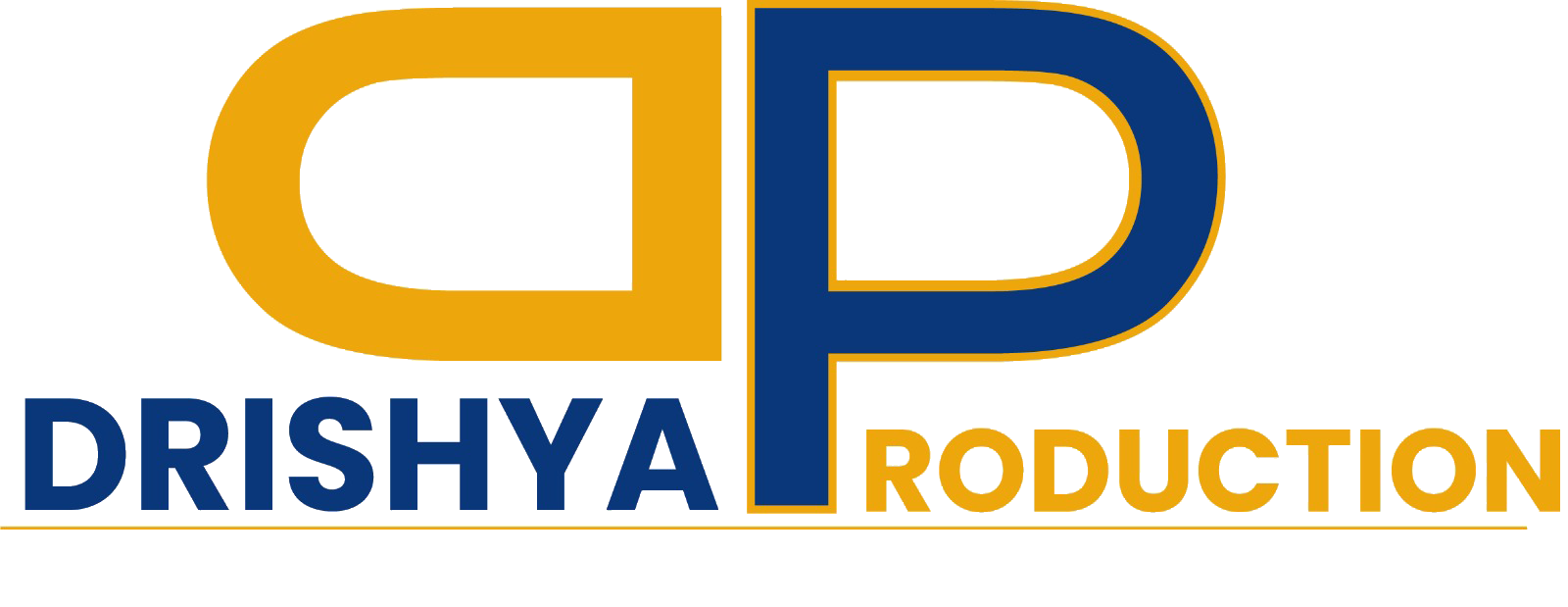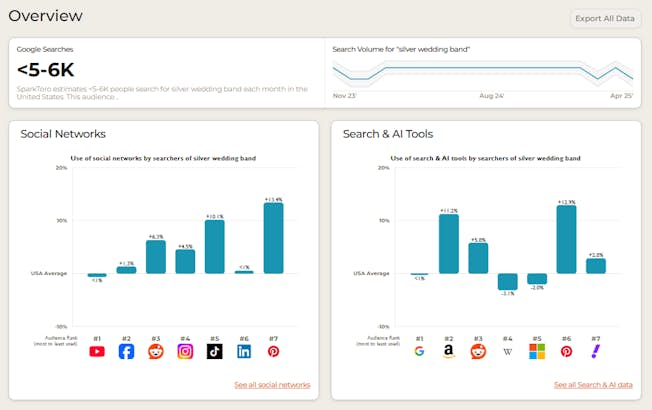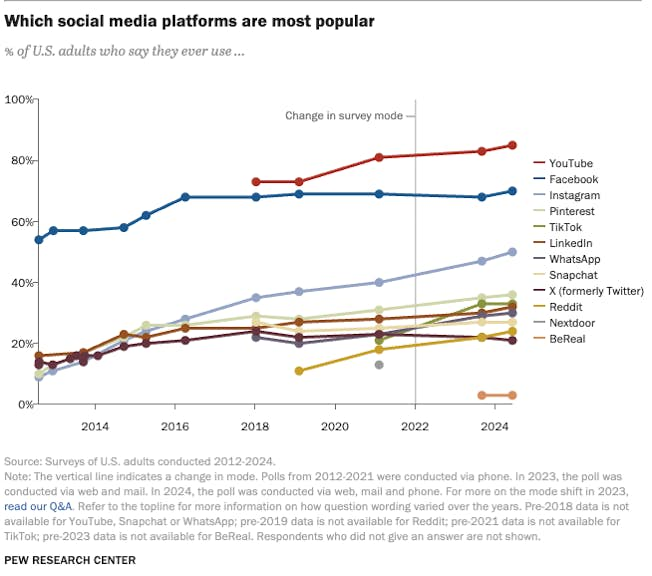

.png)
8 Steps to a Digital Marketing Strategy for Small Businesses
September 16, 2025
Running a small business is no easy feat. Limited budgets, leaner teams, and the constant juggle of time and expertise often make it difficult for smaller teams to compete with their larger, better-resourced competitors, particularly when balancing multiple digital channels.
However, the rise of artificial intelligence (AI) is leveling the playing field. By implementing AI-powered tools into daily responsibilities, small businesses can streamline marketing tasks, analyze customer data, and personalize outreach without the need for budgeting for outside consulting fees.
In this blog, we’ll explore how smaller teams can harness the power of AI to enhance their marketing strategy and bolster their business efforts.
- Why does digital marketing matter for small businesses?
- How can AI tools help your small business?
- 1. Set SMART objectives
- 2. Define your product or service value
- 3. Know your audience
- 4. Choose the right channels
- 5. Create great content
- 6. Put your strategy into action
- 7. Optimize your website
- 8. Budget well
- Be cautious with AI
The insights in this blog draw from our recent Smart Digital Marketing for Small Businesses and Teams webinar with Maeve Kneafsey.
Why does digital marketing matter for small businesses?
Marketing is often perceived as expensive, overly complex, and time-consuming, raising red flags with small businesses who may already struggle to prioritize business needs. But the truth is, the use of digital channels has opened up countless opportunities, making growth more accessible than ever.
Now, professionals can connect to larger audiences in a way that’s both cost effective and measurable.
Some of the key benefits of digital marketing include:
- Connecting directly with customers through social channels (Instagram, LinkedIn, and Whatsapp) and using these channels to offer better customer service through in-app messaging
- Using social media analytics to track activity and buying trends of consumers
- Eliminating geographical barriers associated with traditional marketing (time zones, location, etc)
- Tracking and monitoring marketing campaign success in real time to optimise or tweak content
With so many possibilities, it's easy to get overwhelmed by the volume of marketing tasks at your team’s disposal, even with the help of free/low-cost AI tools.
How can AI tools help your small business?
AI can help you across every stage of your marketing journey, from generating content ideas to drafting and executing in-depth marketing campaigns.
By automating tasks like scheduling, email outreach, or market research, small businesses can free up time to focus on strategy and fostering relationships.
Tools like chatbots and predictive analytics can help even the smallest teams make smarter and more informed decisions. Many AI platforms are also cost-effective and scalable, allowing companies to start simple and expand over time, helping them save resources and stay agile in a competitive market.

AI tools for different marketing campaigns
Take a look at the key steps your team can take to ensure the success of your marketing strategy, and how AI can help you along the way:
1. Set SMART objectives
The first step in setting your business up for success is to set clear, definable, and, most importantly, achievable goals. It’s best to determine your business priority early on, whether that be brand awareness, lead generation, customer retention, or sales development.
That’s where SMART objectives come in. The SMART model is a goal framework that is defined by the following components:
- Specific: Choose a well-defined goal, often characterized by the five W’s (Who, What, When, Where, Why).
- Measurable: Make your objective as measurable and quantifiable as possible, including metrics, milestones, results, and budgetary requirements.
- Achievable: Ensure your goal is realistic by taking into account your team’s resources, skills, time constraints, and budgetary needs.
- Relevant: Keep in mind the relevancy of your goal to ensure you are correctly prioritizing tasks and business needs.
Time-bound: Set a time limit to ensure you and your team stay on track and avoid spending unnecessary time and money on projects.
AI Prompts Checklist for SMART
Learn how to use AI prompts to develop effective SMART goals.
Get it free!
Defining these goals helps eliminate generalities and set a clear timeline for your business, reducing the risk of missed milestones and unnecessary headaches.
Top AI tools for refining objectives and tracking metrics:
- ChatGPT & Claude to draft and refine your goals
- Notion AI to create a marketing scorecard template
- Perplexity AI to conduct competitor benchmarking and research
2. Define your product or service value
Once you’ve set specific goals, you can move on to clarifying your value proposition. This means defining what makes your business different and valuable to your customers and sets you apart from your competitors.
To do this, it’s important to translate your company’s product features into benefits. In other words, show what you do, and why what you do matters for your customers.
Take a bakery, for example. Their value proposition might be daily, freshly baked bread and pastries, which offer customers a healthier, tastier, more local option than buying from a grocery store.
What’s more, to rival their competitors, they might also offer free wifi and readily available plug sockets to encourage customers to bring their devices, providing a comfortable and accessible space for their patrons to work from.
Top AI Tools to define product:
- ChatGPT/Jasper AI/Copy AI to craft product messaging and taglines
- Claude AI to conduct competitor positioning comparison
- Beautiful AI to generate visual product pitch decks
3. Know your audience
Defining your audience is crucial. It’s infinitely easier to draft powerful messaging and compelling marketing campaigns when you know who you are speaking to.
A great way to find out more about your audience is through segmentation. In other words, it's a good idea to group your consumers into different subsections based on age group, occupation, annual income, location, and more.
There are a number of online tools you can use to assist you in the audience segmentation process. For instance, Marketo and Mail Chimp offer built-in setups that allow users to segment audiences directly in the platform.

MailChimp segment test screenshot Source: Segment.com
You can also use data gathered from various social media channels, such as the built-in analytics tool on Instagram, to build realistic profiles for customer personas based on consumers’ motivations, needs, and preferences.
The advantages of drafting these personas include:
- Target improvement: adjust and focus your content so it targets the right customers
- Better lead qualification: identify and prioritize the most valuable leads and opportunities
- Higher conversion rates: persuade customers to take desired actions which can lead to increased sales and revenue
- Boost customer loyalty: foster a strong connection with your audience to ensure customer retention
Top AI tools for audience analysis:
- Sparktoro: Find out where your audience spends time online
For example, the search for ‘silver wedding band’ on SparkToro pulls up information on where people who search this keyword spend their time:

Where people spend their time when looking for silver wedding bands Source: SparkToro
- Typeform: Generate quick customer surveys
- ChatGPT/Claude: Automate persona generation
Pro Tip: Use social listening to gather more data on your audience.
4. Choose the right channels
With much of the planning already done, choosing the right social channels for your small business should come more easily. Channel selection depends heavily on your buyer personas and your company’s objectives.
For example, you and your team might decide that LinkedIn is your preferred channel if your data reveals that your clientele is predominantly professionals, or if you deal primarily with B2B marketers.
Once you’ve analyzed your first-party data, you might want to conduct more research by looking at third-party data. A great resource for this is Pew Research Center, or Statista.

Popular social media platforms Source: Pew Research
Top AI tools for marketing strategy planning:
- ChatGPT/Jasper AI to generate 90-day content plan
- Trello + Butler AI/Asana AI to auto-create campaign timelines
- ClickUp AI to build calendars and workflows automatically
Remember, when it comes to digital channels, consistency is better than perfection. It’s always better to be reliably present than sporadically polished.
Pro Tip: Start by using one or two social channels and learn to master them. From there, you can gradually expand your reach by acquainting yourself with other platforms.
5. Create great content
Compelling content is what helps draw your audience in and keeps them engaged. Without effective, engaging, and informative copy, you risk losing your customers to your more on-the-ball competitors.
This can come in the form of blogs, newsletters, social posts, videos, and case studies, to name a few.
Many small businesses, however, find it difficult to set aside the necessary time it takes to draft engaging content. Instead, leaner teams can prompt generative AI (GenAI) to, say, draft a 600-word blog on lead generation. Users can even ask AI tools to implement keywords based on their own SEO research, or draft a social media post based on real-time trends.
Some examples of effective AI prompts include:
- “Draft five Instagram captions for a Father’s Day post for…”
- “Write an engaging blog about the benefits of mindfulness for my business. Include the following keywords…”
Top AI tools for content generation:
- Jasper, Canva, and Copy.ai for more creative content
- Hootsuite/Buffer for automating social post scheduling
- SurferSEO & Hotjar for Search Engine Optimization (SEO)
Case Study: Happy and Glorious Giftshop
One small business owner harnessed the power of AI to beat writer’s block she was experiencing when trying to draft product descriptions for her boutique gift shop.
The owner, Kate Tompsett, used ChatGPT to draft a content plan and calendar, claiming the GenAI worked as a sort of “virtual social media manager,” even going so far as to nudge her when it deemed it time to post.
The results? In just two months, Tompsett’s instagram following grew by more than 1,300 users, user engagement more than tripled (in the form of likes and comments on her posts), and her TikTok account viewership blew up, with one of her videos amassing nearly 150,000 views.

Small business owner Kate Tompsett in front of her shop, Happy & Glorious
6. Put your strategy into action
Once you’ve defined your objectives, clarified your value proposition, built personas, selected your channels, and mapped out your content, the next step is to put your strategy into action. This is where all the pieces come together into a cohesive plan.
Top AI tools for strategy visualization:
- Miro: Helps users create clear strategy maps
- Notion AI: Turns ideas into structured workflows to help keep teams on track
Remember that execution is only the beginning; successful marketing requires iteration. Use A/B testing on subject lines, ads, or campaign concepts to see what resonates most with your audience, then refine and optimize as you go. By combining structure with experimentation, small businesses can maximize impact without stretching resources too thin.
7. Optimize your website
Your website is the heart of your marketing efforts, so it needs to be fast, mobile-first, and readable by both search engines and GenAI tools. Otherwise, you risk wasting valuable budget driving traffic to a site that fails to convert or retain visitors.
Search Engine Optimization (SEO) is an essential part of this, and AI tools make implementing SEO best practices infinitely easier.
Top AI tools for SEO optimization:
- SurferSEO: Helps refine and optimize content so it aligns with what’s ranking in search results
- Drift: Brings in AI-powered chatbots to engage visitors in real time and capture leads
- Hotjar: Provides heatmaps and behavior insights, showing exactly where users click, scroll, and drop off
By prioritizing site speed, usability, optimization, and using the right AI solutions for support, you can turn your website into a high-performing hub for growth in the organic search engine results.
Additionally, GenAI has become another channel in which you want to appear. It’s important to optimize your website both for SEO, but now also Generative Engine Optimization (GEO).
Pro Tip: Use AI tools to help you with your website’s development
8. Budget well
When every penny counts, budgeting wisely is critical. That’s why the best approach when exploring new applications and platforms is to start free and scale later. Use free versions of marketing and AI tools first, and only upgrade once you’ve proven the value. Otherwise, you risk wasting precious marketing dollars on a host of platforms, many of which you won’t even end up using.
From there, let data guide your allocation and build a sustainable plan to keep spending on track. You can even use AI to help recommend spending splits such as dedicating 80% of your allocated budget to priority channels while reserving 20% for testing experimental ones.
For evaluating past performance, use Google Looker Studio for in-depth reporting, Mixpanel for user behavior analytics, and Domo for multi-source integration.
Top AI tools for budgeting:
- To set clear goals, use Funnel.io to unify data, Klipfolio for KPI dashboards, and Databox for automated goal tracking.
- To effectively allocate spending, use Singular for cross-channel ROI, Madgicx for dynamic ad reallocation, and Allocadia for aligning budget with business goals.
By combining free-to-start experimentation, structured budget tracking, and AI-powered insights, small businesses can stretch their resources further.
Digital Marketing Budget Tracker
Track your budget across channels for every month & quarter
Download Free
Be cautious with AI
While AI tools offer incredible efficiencies and creative boost for small-business marketing, it's vital to approach them with a healthy dose of caution. As we’ve all come to learn, Generative AI is notorious for “hallucinations”, or producing content that reads confidently but is factually incorrect or even fabricated, alongside relying on outdated information or creating bland, generic messaging that lacks brand character.
To best protect yourself against AI’s pitfalls, you should always ask the AI tools you use to cite sources, making sure to verify them before publication.
With the above in mind, many people use AI-generated content to fortify their own text, rather than relying on it wholeheartedly to draft copy.
Why not take things a step further by layering in your own brand voice? This ensures your content comes from an authentic perspective, and keeps writing vibrant, relatable, and human.
And perhaps most importantly, it’s crucial to safeguard your customers' privacy by never feeding proprietary or personal data into public AI models without assurance of data protection.
Pro Tip: For a deeper dive into how these practices align with ethical AI use in digital marketing, check out this helpful guide from the DMI on the ethical use of AI.
Conclusion: AI is levelling the playing field
Digital marketing isn’t just for big brands. With AI, small businesses can move faster, smarter, and more affordably, empowering leaner teams to bolster their marketing efforts.
To get started on your marketing journey today, we recommend taking the following steps:
- Make sure to define a clear business objective from the start to avoid unnecessary headaches and wasted time.
- Draft personas for your audience to help you better understand their consumer habits, social engagement, etc.
- Experiment with Gen AI to create your first piece of content, whether that is a social media caption or a long-form blog piece.
And remember, start small, stay consistent, and let AI supercharge your growth.
Supercharge your digital marketing career
There’s no better or faster way to break into the digital industry than with a digital marketing certification. DMI’s certified and industry aligned Professional Diploma in Digital Marketing will teach you the fundamentals of digital marketing, show you how to leverage AI in your marketing activities and simple ways to cultivate soft skills. You’ll also explore key channels such as email marketing, social media, SEO, content marketing, and display and video advertising to execute successful marketing campaigns in any industry.

